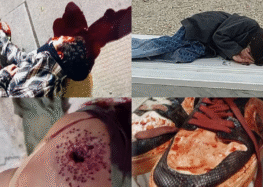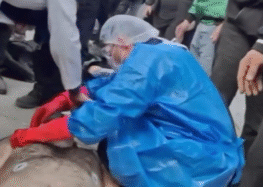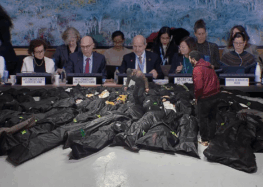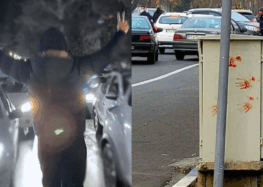The Search of Parvin Fahimi — Sohrab Aarabi’s Mother
A report from 25 days of nonstop searching by the Peace Mother, Parvin “Ameneh Khatoon” Fahimi:
————–
Open Your Eyes Sohrab, Your Mother Is Staring At You
How soon you grew up, Sohrab!
In these 25 days that your mother was looking for you
How many years did you grow up?
The coroner’s doctor decided that even though you were 19
They would rather put you in the “25 year olds” album
Because you were shot on the 25th of Khordad (June 12th)
Open your eyes Sohrab!
Mom is staring at your picture
————–
She is looking through pictures. She has never seen this many dead bodies. Cold dead bodies. Bodies with no names, no identity. She has never stared at so many dead bodies. And now she is forced to stare. Stare at faces with closed eyes. Faces so young. Faces so beaten. Faces so afflicted yet quiet. How many faces has she passed by? She counts. She has already passed about a dozen faces…
His eyes are closed. His eyebrow’s broken line, his goatee and his new beard. His nice-looking nose. His thin and sparse mustache that is lying on his beautiful and silent lips… Open your eyes, Sohrab!
Dear God, this is the smiling flower you sent me…
On 25 Khordad (June 12th), they were just some drops in an ocean of people. Sohrab was all ‘green’ and awake until last week. In the human chain from Tajrish to Rah Ahaan, in the midnight protest from the Seda va Sima (radio and TV station) to Vanak Square, in the green wave protest from the Revolutionary Square to Azadi Square. Sohrab’s eyes were open. The reflection of the green tape over his head and the green scarf around his neck on his glasses made his eye colors like honey. But on 25 Khordad (June 12th), the campaigns were over. It was a day of protesting. Wearing a simple black shirt, jeans, and sneakers. The whole family was gathered to join the river of citizens in Jamalzadeh. Parvin was walking slowly. She didn’t have the power to be as youthful as Sohrab. She was much faster thirty years ago in these same exact streets. During these years, she has put her dexterity into her sons’ wellness and greatness.
Parvin howls. Turns to her dear friends with losses in their families and asks:
“Tell me how you did it. How did you bear with it? Tell me! I don’t have the efficiency to bear with this. Tell me what to do? Tell me!”
Sohrab gave his mother away to his brother, he was faster with his friends. These are the experiences all mothers have these days. The experience that sons don’t have the patience to bear with their slowness. They get to Azadi Square, the peaceful protest has ended. Sohrab has disappeared within the crowd. Maybe he went home. They go home. It is now 8 pm. Sohrab is not home yet. The news goes around, there has been shooting in Azadi Square. All family members are now on the team to find him. First, hospitals. They call the Emergency. They get the name of a couple of hospitals that Emdad (the emergency team) has taken the injured to. Fayaz hospital has a morgue. Sohrab wasn’t there. They said it was a young man named Hesam Hanifeh. He was identified. They go to Imam Khomeini hospital, Shariati hospital, Firouzgar, Payambaar, Rasoul Akram, Sohrab wasn’t anywhere. Emdad said that people have been taking the injured to the hospitals themselves, so search! They searched.
Now it’s time to search the police stations. Azadi Square (Apadana complex) police station, Yaft Abad (Vali Asr complex) police station, Navab, they said go to the security police. They go to Pastor Street. They said, “Go and return tomorrow.” It is tomorrow and the goings still continue. The 110 police (emergency 911) says he’s not on the list of detained citizens, go to the closest police station and order a lost person search. They go to police station 135. Now a loss file has been made. Sohrab had his cell phone on him. They call him until the morning and that cold machine voice kept saying that “the number is not available” and from 8 AM it has been saying that the “phone is off.” They give them the cell phone number as well as the phone number identifier. The police station staff says with this information you can track anyone. It’s Wednesday. They go to the information center in Shapour Street. 25 families are also there. Only 5 families find out about their lost ones. They have been captured. The rest, are still just there, confused. Someone says go to Evin! Go to the Revolutionary court!
From the next day, they join the confused crowd between The Revolutionary court and Evin prison. Sohrab’s name is nowhere to be found. Not on the list of people in Evin prison, not on the list from the Revolutionary court. Parvin is not alone. There could be a separate list of families in similar situations. Parvin spends her days looking for clues regarding her son, and her afternoons holding a picture of Sohrab in her hand, in front of Evin prison, showing it to the ones who have just gotten out: “It’s my son; Sohrab Aarabi. Have you seen him?” Some of them are certain they have seen him.
Families don’t rely on this. They go to Ghezel Hesar and Shour Abad. No information. Not even anyone at the Shapour information center is answering. The officials aren’t here. They are on duty. It’s the Saturday of next week. They call when the people in charge are back to work. They go Shapour station. The main station for identity recognition. Sohrab Araabi, 19 years of age. From the “15-20 year olds” albums and the “20-25 year olds” albums, they show them 7-8 pictures. Sohrab is not among them. So, he is at Evin prison. Thank God! Parvin would rather go to the Revolutionary court and Evin prison daily.
Sohrab has to take Konkour (a pre-university exam in Iran, very important, the only real chance anyone can get higher education). The Wednesday before the Konkour, they announce that if anyone has a child who needs to take the exam, bring the documents and we will let them free. Parvin is not crying anymore. She wants to say what she has been through. So, she doesn’t cry anymore, she talks. She says,
“On that Wednesday in front of the Evin jail, they accepted everyone’s documents that were on their list, but they didn’t accept ours. The next day, on Thursday, they gathered us under the Evin Bridge. Somebody came and told us that if someone is not on their list, and has to take the test, but nobody has contacted them, it is none of their business, that they are in private cells. Go look for their files in the Revolutionary court. We went to The Revolutionary court and for the first time they let me in. We gave them the name. We were 39 people who had children who had to take the exam.”
Parvin continues with sadness, “Outside of the court, they had a table for Konkour eligible students. They asked Sohrab’s name and information and wrote them down. They said to go and take care of the bail. We took care of it. They gave us a 10 million Toman ($9000) bail bill. You can go, we faxed it and they will be free today.”
Parvin can’t take it. She starts crying again.
“I took some clothes for him. I thought to myself, what if his clothes are torn? And he doesn’t want to come home with torn clothes?”
Parvin returns to Evin prison that evening. She covers the cement blocks on the street and waits until night. Midnight. Morning prayer Azan. And the morning. Sohrab doesn’t come.
On Friday, the Revolutionary court was open. I went and started crying in the court. I told them it’s ok if you haven’t bailed him out, yet, just tell me if he is ok or not. One of the staffs at the judge’s court told me, “Relax, your son is ok.” There was a young man sitting in the back. When he saw me crying, he came and asked for Sohrab’s information and left. He came back after a couple of minutes and said, “Your son has interrogation today, and he can’t make it to Konkour.” I asked, “Are you sure?” He said, “Go home, and relax.” I said, “I will count on your words and I will go, just remember you promised me.”
Parvin never saw that young man again. She asks around and was told that he was probably on duty in that station and now he is done with his duty and gone.
The next day she went to the same station of the Revolutionary court. There are 10-11 people whose children have been bailed out, but they don’t know where they are. The Azad University Konkour has begun. Parvin says,
“In the Judge’s court, they asked for our names. They hadn’t agreed on bailing two of the people. They wrote down the rest of the names and faxed them to Evin prison. They said go home. They will be bailed out either today or tomorrow. I saw that he wrote Sohrab’s name on the paper and faxed the paper. We waited two days and went to the Revolutionary court again. From those names, three people were left and I was the third one. The assistant judge from the station told me, “Your son is with the phosphorics (highlighted).” I asked him what he means. He said, “It means he goes around and puts banks and buses on fire.” I told him, “My son has morals and values and he is known for that in the family. If you don’t know my son, you shouldn’t say this.”
They faxed the names again. Parvin waited again. Sohrab still didn’t come.
Parvin continues, “I went to the Revolutionary court again. The secretary of the station told me, “Lady, your son’s name is not on the list from Evin, so he is not in jail.” I told him the story of that young man from the other day. He sent us to the person in charge of running the rules in Evin. We were three people. The first one had lost his files and documents. The second one had their maiden name spelled wrong. On my turn, they said he’s not here. They said maybe you didn’t give his name correctly. They looked for him from other identities from people born in 68 (1990), the list of Konkour eligible students, his name was nowhere. They said if his name is not here, he might be in the private cells. Go to the security police.”
Parvin tells about her nonstop tireless challenging search. Nobody tells her that if Sohrab’s name is not in the Evin list, then he is not in jail. Nobody says that. Not the concierges. Not the officers. Not the judge assistants. Not the judges. None of them. It’s not clear why nobody is saying the final word to this mother.
They tell Parvin to go to the security police, “I went to the security police. The person in charge enters Sohrab’s information into the computer. He says, ‘He’s not with us.’ I come out and cry so much that he takes me to the person in charge again. He tells us to go to a different station because he is definitely there. I go back to the judge at the Revolutionary square again. There are two other people there who don’t know where their children are, with the difference that their children already called them on the first day. The judge calls me after the two of them. I told him the story. I told him that I haven’t heard anything from my son for 17 days. He said that he’s not with them. I asked what I can do. He told me to go find him myself. To go to the prosecutor.”
Parvin doesn’t want to go to the prosecutor. She holds herself back for a day. At the end, her maternal feelings win. “The prosecutor is nothing. For Sohrab, I would go anywhere.”
The prosecutor wasn’t there. She sits in his office with a picture of Sohrab in her hand. Crying. The prosecutor comes back. He tells Parvin that he will look into the file. Parvin sits in his office for two hours. She reads prayers. She reads Mafatih (Islamic prayers). The person in charge comes. He tells her to give him another twenty minutes. That he is looking for your son. He calls Parvin after half an hour.
“He told me to sit down. He said your son is in Evin and he is fine. He said to go home and to relax. When I said why he hasn’t called he said, I will tell him to call, go home and wait for a phone call!”
Parvin goes back home happy. The prosecutor has told her that her son is fine. She sits home on Wednesday and Thursday and Friday because maybe the phone would be the only way of connection between her and her only one. On the evening of these days, she goes to Evin with clean clothes. Maybe Sohrab will come.
On Saturday she is impatient, she goes to the Revolutionary court. She tells one of the staff that her son hasn’t called. The questioning begins again. The judge’s assistant comes and tell her that “the prosecutor called us and asked us and we told him that your son is in the Evin jail. We told you the same thing, why are you making a big deal out of this?” Parvin says, “You didn’t tell me.” The assistant says, “Here is bow-and-arrow that you were standing right here in this part.” Parvin says, “Okay then I didn’t understand.” He says, “Go home, and relax. Your son is having fun in Evin and you are killing yourself here.”
It’s a new day. On Sunday, the day before His Holiness Ali’s birthday, Parvin writes a letter to the prosecutor. She says, “Dear Prosecutor of Tehran, I hereby ask you due to His Holiness Ali’s birthday, to please allow me to speak to my son via a phone call.” She doesn’t hear back.
On Saturday, 20 Tir (July 10th), she goes again to the Revolutionary court for the twelfth time. They say the same thing, “Sohrab’s name is not on our list. Go to Shapour station.” Shapour station? We went again and looked at the pictures. “Go again.”
Parvin goes. She goes to the investigator office. This time the album is thicker. They take a look at the album of “25-30 year olds”. But Sohrab is only 19 years old. How quickly you grew up Sohrab. In these 25 days that your mother was looking for you, how much older did you grow? The coroner’s doctors identified that even though you are 19, they will put you in the “25 year olds” album, because you were shot on the 25th of Khordad (June 12th). Open your eyes Sohrab! Your mom is starring at your picture.






